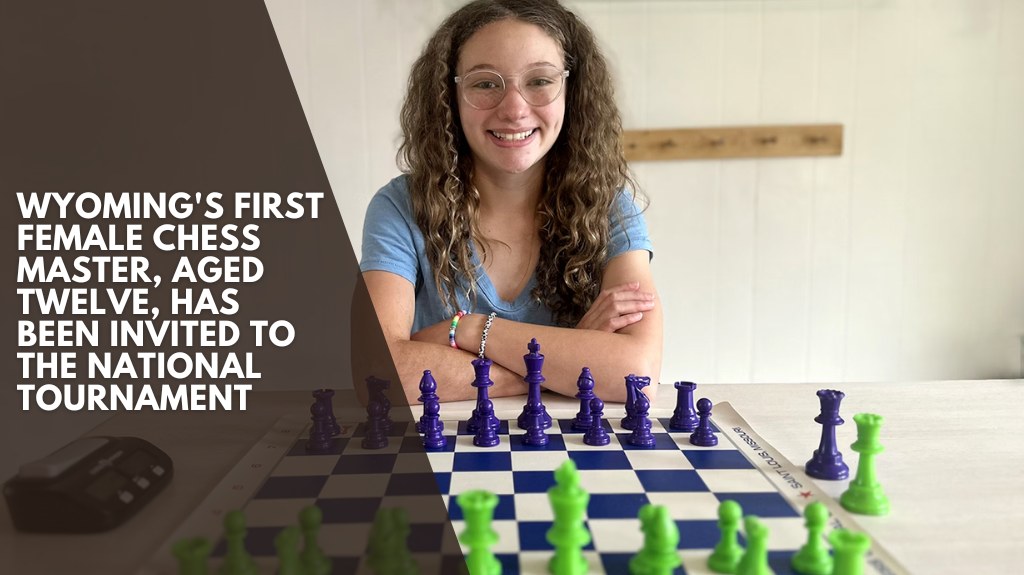Kamari Barth has always enjoyed puzzles, so each time she sits at a chess board, she sees it as just another one to solve.
“I like the strategy,” she explained. “I like seeing it. I can see it in my mind. “It’s just really enjoyable to play.”
The 12-year-old Sheridan girl began playing the game two years ago and has quickly advanced to the point where the Sheridan Chess Association chose her to compete in the Susan Polgar Girls’ Invitational last month.
The national chess tournament is open only to young female players who have received an invitation.
“We’re really proud of her for going, knowing that it was going to be tough competition,” SCA member Dan Casey said. “She worked so hard.”
Barth’s family also claims she’s the first Wyoming native to compete in the tournament.
More Than a Board Game
Barth joined a homeschool chess club when she was ten.
She considered it a fun board game and enjoyed competing against her father at home. Kamari began to take chess seriously about six months after she first started playing.
“I realised that it’s not just a board game,” she told me. “It’s a big deal. It is a sport. “I want to get really good at this game.”
She started playing on the ChessKid app, and when she outperformed her father, she joined the Sheridan Chess Association. The club is closed for the summer, but meets on Thursday nights at the Sheridan County Fulmer Public Library the rest of the year.
“Personally, I think it really speaks to how her brain works,” father Jim Barth explained. “She’s really good with maths and numbers, and so chess really highlights some of that with the strategy and movement of pieces.”
Kamari does not keep track of how many hours she spends playing the game each week, but she says she usually plays at least once a day.
“Some days it’s like, ‘I really want to do chess a lot today,'” she told me. “Some days it’s like, ‘I’ll just play a game and relax,’ but it really depends on how I’m feeling, if I want to learn more or just play a game and then rest.”
The next move
Sheridan has a strong chess community over the years, making it an ideal place for newcomers to learn. Before COVID, the club had 150 chess players.
It reopened about four years ago and now serves an average of 40 people, including 10 adults and 30 children. Players in the club range in age from six to eighty-four.
“We’re very supportive of trying to get kids to play this, because it takes away from a lot of the electronic games,” Casey told me. “It is extremely beneficial for mental development, not only for children, but also for seniors, to keep their brains active. It simply transcends age. If a child is sharp and has played for a few years, they can often outperform many adults.
Kamari has participated in the SCA’s youth tournament.
It has also hosted the state tournament for the past two years and began hosting an annual tournament each spring when the club reformed following COVID, which has drawn participants from all over the country, as well as some international players and a handful of grandmasters.
“It’s been growing every year,” he said. “Getting grandmasters at any chess event in Wyoming is unbelievable, because there’s not even a grandmaster in Wyoming,” Casey told the crowd.
The Sheridan Chess Association strives to send deserving young players to national tournaments whenever possible. So, when club officials learnt about the tournament, they decided Kamari was the best option. They sponsored the trip and assisted her with preparation.
“We have quite a few girls in the club, and we had sponsored another girl who went to nationals,” Casey told me. “Kamari’s chess playing is still in its early stages, but you can see her progress month after month at the club. She enjoys playing the game and has a strong analytical mind, so she excels at visualisation.
Learning the Fried Liver
To prepare, she played several chess games, including some against her 9-year-old brother.
She also worked with Casey, who taught her a few opening attacks, including the Fish Hook Trap, Italian Opening, and Fried Liver, an aggressive chess opening that involves sacrificing a knight to attack the opposing king. The latter soon became her favourite.
“Kamari and I sat down, and I taught her the Fried Liver Attack,” Casey told me. “She likes to attack, so she liked the name. It’s a fairly aggressive opening that I learnt when I was around Kamari’s age. It’s a lot of fun, especially against opponents who aren’t expecting it.”
Casey also made Kamari do chess puzzles every day to improve her chess tactics by increasing pattern recognition and awareness.
“I prefer doing puzzles online rather than on paper because I can say, ‘Yes, that was the correct move,'” she explained. “And then you’ll see where all of the pieces are. “On paper, you’re mostly thinking about it.”
She also conducted her own research, as Sheridan boasts the sixth-largest chess book collection in the country, with over 1,000 DVDs and chess books. The collection was donated by SCA members and the community. The SCA also purchased a few of the available items.
“Anybody in Wyoming can check them out through their public library, which is nice,” Casey told me.
Heading into the tournament, Casey told Kamari that winning just one game would be an impressive feat, and if she didn’t win, “then you went and had a great time and got a lot of experience because you’re playing against the top 50 girl chess players in the United States.”
Queen of Chess
Susan Polgar is an American grandmaster and four-time world chess champion. She founded the Susan Polgar Foundation to promote chess among young people of all ages, particularly girls, across the United States.
One of the tournaments she founded was the Susan Polgar Girls’ Invitational, the first all-girls event sanctioned by the United States Chess Federation. The tournament aims to promote chess among girls by awarding prizes and scholarships to the winners.
“She was the very first female Grandmaster, and so her passion is to try and get more girls interested and involved in playing chess,” Jim told me.
“It worked and the camaraderie and care that each girl there showed for one another — they could sit down and they could play a game, one would win, one would learn and then they were still friendly — was really beautiful to see.”
The tournament took place in St. Louis, Missouri, from June 21 to June 25, and it featured players from all over the United States. Kamari competed against players from Oregon, Illinois, Indiana, Oklahoma, South Dakota, Kansas, and Washington, DC.
“I was very nervous, because this was my first time going to a chess tournament,” she explained. “I was like, ‘I don’t know what I’m doing,’ but I eventually got the hang of it.”
To compete, participants must be younger than the age of 19.
“I went against an 8-year-old and she beat me,” she informed me. “It’s crazy to see that young kids are playing chess really well.”
Kamari first played six long games, followed by seven blitz games. Long games are tournament games with strict time constraints, whereas blitz games are fast-paced with much shorter time limits.
Long games promote deep strategic thinking and meticulous planning, whereas blitz games prioritise speed and quick tactical calculations.
“I won one game and that was what I wanted to accomplish,” Kamari informed the crowd. “It was really fun and cool to see all these other girls that love chess as much as I do,” she told me. “I’ve learnt a lot. I wrote down my moves so that I could go to a grandmaster and have him review my game with me and give me some advice on what I should do differently.
One of the most important lessons she learnt from the tournament was the importance of patience.
“I was rushing a bit and when I made my move, I realised, ‘Oh no, I shouldn’t have made that move, because now she’s going to do this,'” she told me. “I should take my time and look at all of the board instead of just one bit.”
Kamari intends to continue studying and playing the game to improve her abilities. She hopes to compete in more chess tournaments in the future, and maybe even return to the Susan Polgar event as an alumni.
“It was fun to watch her grow while we were there and just try something new,” Jim told me. “Hopefully we’ll see her do some other U.S. [Chess Federation] tournaments, then she’ll get an official ranking that she can continue working on.”












